Are You Taking Fake Fish Oil for Arthritis That’s Hurting You?
Is there any possibility that you’re taking fake fish oil for arthritis that’s hurting you?. I’ve blogged many times on how good fish oil seems to be able to help arthritis. I’ve also discussed that not all fish oils are alike and that it’s unlikely you’re taking enough fish oil to really help your arthritis. The biggest issue with “bad fish oil” has traditionally been thought to be limited to whether it was oxidized (rancid or smelled fishy) and whether it had loads of heavy metals and other environmental contaminants. However, a study published this week has opened up a new and potentially very serious health concern. Is the fish oil you take fake and thus harming you more than helping you?
I’ve discussed that there are two triglyceride forms of fish oils that you should pay attention to: EPA and DHA. The DHA is a natural part of the fish oil that has been linked to all sorts of cardiovascular benefits. In particular, it’s been linked to a natural ability to lower blood pressure. How all of this worked has been somewhat of a mystery, but has become a little clearer over the last few years. The author of this new study (Hoshi) seems to have finally figured out what happens, but in doing so uncovered some very concerning things about fake fish oil.
To lower blood pressure, DHA must bond to specific ion channels on the smooth muscle in blood vessels to relax those muscles (see the rather complex diagram above). Hoshi found that while real fish oil DHA in it’s natural triglyceride form can activate these channels and reduce blood pressure, the opposite can occur if the fish oil is overly processed (containing ethyl esters or EEs). In this case, when the artificially created EE form of processed fish oil interacts with this area, it can’t activate the receptor. So the switch that should lead to the muscles relaxing and blood pressure going down can’t be flipped by EEs. Just as concerning is that the EEs sits on this receptor and blocks access for the natural forms that could flip the switch and lower blood pressure. In fact, when the fake fish oil ester and the natural DHA triglyceride compete for the receptor, the artificial fish oil wins. This causes tighter blood vessels and could actually raise blood pressure!
So are you taking fake fish oil for arthritis? I was so concerned about this issue that this morning I checked the brand I take (Nordic Naturals) and was relieved to find that they maintain the natural triglyceride DHA form in their concentrated fish oil. The concern for our patients and others is that the vast majority of concentrated fish oils sold in the United States are the cheaper to manufacture EE concentrates (fake fish oil). This is because the concentration process can create EEs and converting them back to the triglyceride form with natural enzymes is expensive, adding about 30-40% to the final bulk ingredients. How do you know if the fish oil you’re taking contains EE’s? The easiest way to check is to go to the manufacturer’s web-site and see if there is a discussion about EEs and how their fish oil concentrate is converted back to the natural triglyceride form after concentration. If not, then there is another way to test for EEs. Get a Styrofoam cup and cut open 10 capsules and dump the capsule contents into the cup. Wait 10 minutes and see if the cup leaks. EEs will eat through the cup in a few minutes. Natural triglyceride fish oils will last in the cup for a few hours before dissolving the cup.
The upshot? Don’t take cheap fish oils! You need concentrated fish oils so you don’t have to eat the way the Greenland Eskimos do (fish for breakfast, lunch, and dinner topped with fish oil used like salt). However, if that concentration process creates EEs to save money, you may be hurting your health more than helping it!

If you have questions or comments about this blog post, please email us at [email protected]
NOTE: This blog post provides general information to help the reader better understand regenerative medicine, musculoskeletal health, and related subjects. All content provided in this blog, website, or any linked materials, including text, graphics, images, patient profiles, outcomes, and information, are not intended and should not be considered or used as a substitute for medical advice, diagnosis, or treatment. Please always consult with a professional and certified healthcare provider to discuss if a treatment is right for you.

